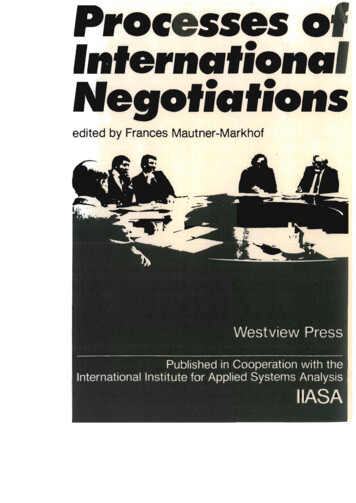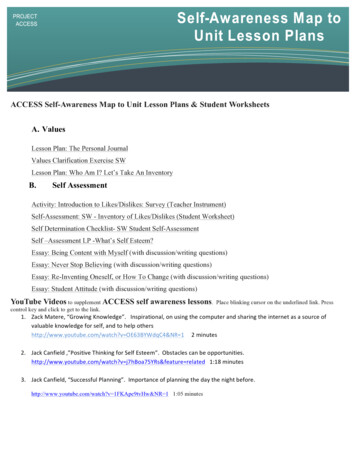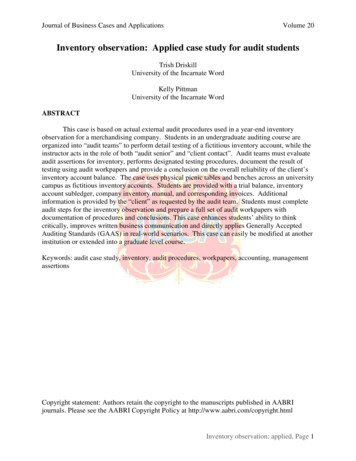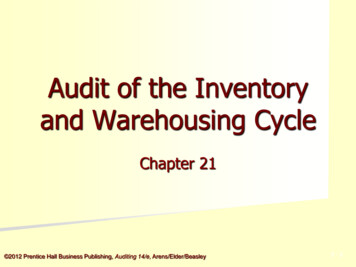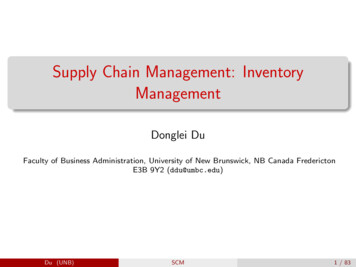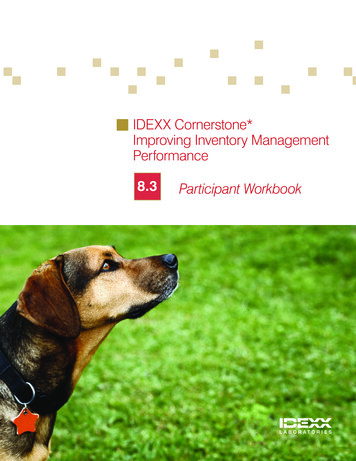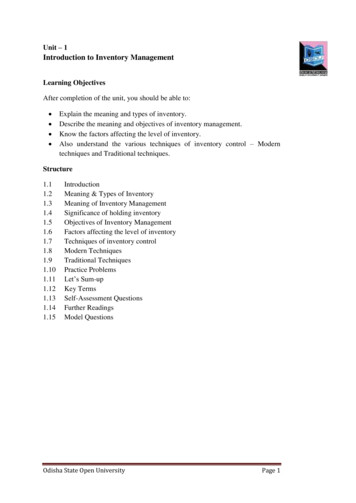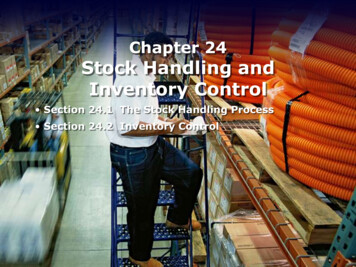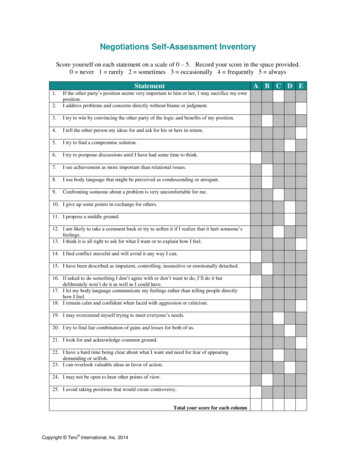
Transcription
Negotiations Self-Assessment InventoryScore yourself on each statement on a scale of 0 – 5. Record your score in the space provided.0 never 1 rarely 2 sometimes 3 occasionally 4 frequently 5 alwaysStatementA B C D E2.If the other party’s position seems very important to him or her, I may sacrifice my ownposition.I address problems and concerns directly without blame or judgment.3.I try to win by convincing the other party of the logic and benefits of my position.4.I tell the other person my ideas for and ask for his or hers in return.5.I try to find a compromise solution.6.I try to postpone discussions until I have had some time to think.7.I see achievement as more important than relational issues.8.I use body language that might be perceived as condescending or arrogant.9.Confronting someone about a problem is very uncomfortable for me.1.10. I give up some points in exchange for others.11. I propose a middle ground.12. I am likely to take a comment back or try to soften it if I realize that it hurt someone’sfeelings.13. I think it is all right to ask for what I want or to explain how I feel.14. I find conflict stressful and will avoid it any way I can.15. I have been described as impatient, controlling, insensitive or emotionally detached.16. If asked to do something I don’t agree with or don’t want to do, I’ll do it butdeliberately won’t do it as well as I could have.17. I let my body language communicate my feelings rather than telling people directlyhow I feel.18. I remain calm and confident when faced with aggression or criticism.19. I may overextend myself trying to meet everyone’s needs.20. I try to find fair combination of gains and losses for both of us.21. I look for and acknowledge common ground.22. I have a hard time being clear about what I want and need for fear of appearingdemanding or selfish.23. I can overlook valuable ideas in favor of action.24. I may not be open to hear other points of view.25. I avoid taking positions that would create controversy.Total your score for each columnCopyright Tero International, Inc. 2014
Negotiations Self-Assessment ScoringThis assessment inventory is designed to measure the behaviors you rely on most readily in negotiationsand the typical outcomes that result.The columns on the self-assessment correspond to one of the five behaviors. Record your column scoresin the model below corresponding to the appropriate letter. The higher your score in each area, thegreater your tendency to exhibit those danceLegend0510Interests, needs andvalues unmetInterests, needs andvalues somewhatmetInterests, needs andvalues completelymetThe model above shows the five approaches (behaviors) and the corresponding possible outcomes basedon the degree to which the interests, needs and values of each party are met or unmet.What do my scores mean? A score of 5—10 indicates a slight reliance on this behavior in negotiationsA score of 11—19 indicates a moderate reliance on this behavior in negotiationsA score of 20—25 indicates a strong reliance on this behavior in negotiationsA high score in two or more areas may mean that you have developed behaviors (either appropriate orinappropriate) in a second behavioral area that you rely on interactions. For example, many people findthey rely on collaborative or compromise behaviors when they are at their best. However, when they feelstressed, pressured, anxious or angry, they resort to a secondary behavior such as accommodation,aggression or avoidance.Copyright Tero International, Inc. 2014
Behavior DescriptionsThe columns on the self-assessment correspond to one of the five behaviors. The higher your score ineach area, the greater your tendency to exhibit those behaviors.A AvoidanceNegotiators who are eager to avoid confrontation ignore problems, their own needs, the needs of the otherparty and the relational dynamics present. This approach results at best in a delay or at worst in aLose/Lose result where both relationships and results are sacrificed.Is Avoidance ever an appropriate strategy? You might choose to use this approach for the followingreasons: The issue is unimportant to you and you can drop the subject without harboring ill feelings.You believe the damage incurred by any conflict would outweigh the benefits of voicing yourside of the story.You have no power to change the situation.You need to cool down (deferred avoidance).You need time to gather more information and make sure that you’ve understood the situationaccurately.You prefer to choose your battles wisely and since you are not positive that the issue is the realheart of the matter, you would prefer to wait and uncover the real problem.B AggressionAggressive negotiators focus exclusively on their own objectives. They are eager to win, even at theexpense of others. They attend only to short-term outcomes. Trust and long-term results may bejeopardized in pursuit of this I Win/You Lose outcome.Is Aggression ever an appropriate strategy? You might choose this approach for the following reasons: You need quick decisive action and do not have the time for a lengthy negotiation. Your job is to enforce unpopular rules and you are genuinely not open to feedback. You are certain something is non-negotiable and immediate compliance is needed. You are protecting yourself against other aggressive people who view attempts to collaborate as asign of weakness.C AccommodationNegotiators who focus too heavily on the relational dynamics avoid attending to their own needs andinterests. They risk a You Win/I Lose outcome in which the other party wins at your expense.Is Accommodation ever an appropriate strategy? You might choose this approach for the followingreasons:Copyright Tero International, Inc. 2014
You realize that you were wrong and are now willing to concede to the other person.You care less about the issue than the other person and are willing to let them win this round.You are losing anyway and want to cut your losses.You dislike conflict and want to restore harmony.D CompromiseThis common approach to negotiations searches for middle ground in resolving differences rather thanpursing potential solutions that often are found in common interests. It results in getting some of whatyou want and some of what you don’t want. Compromise is our usual default but is less than a WIN/WINsince it results in a both kinda win both kinda lose outcome.Is Compromise ever an appropriate strategy? You might choose compromise as your approach for thefollowing reasons: The issue is only moderately important to you and you’re willing to go partway.You need to achieve a temporary agreement.Your efforts at a WIN/WIN negotiation have failed and a compromise is your Plan B.You do not want to make the creative effort to find options that completely satisfy both sides’needs.E CollaborationCollaborative negotiators stand up for their own interests, needs and values while honoring the interests,needs and values of others. They are results-oriented and are sensitive to the relational dynamics present.They seek to create value in non-obvious ways through working with the other party and then ensure thatthe value they extract meets their own goals and represents a satisfactory outcome for others. Betweencompeting and accommodating, and beyond compromise, lies a balance of collaborative behaviors thatlead to WIN/WIN.Is Collaboration always the best approach? Since it takes a greater investment of time and energy, you’llwant to weigh your goals in advance before embarking on a collaborative approach. In most cases, you’llfind the results worth the effort expended. As with all things that require skill, the more you engage in thebehaviors, the easier and more effortless they become. Commit to making collaboration your defaultstyle of influencing.Choose Collaboration as your approach for the following reasons: You are anxious to maintain your good working relationship with the other person/people.You would like to learn as much as possible from the situation.You need a solution that everyone will be happy with for a while.You want people to have a sense of increased empowerment through the consensus-buildingprocess of a WIN/WIN negotiation.You want to model good negotiations and conflict resolution to others.Your goals require input from many members of the team—you need all perspectives as well ashigh-quality results.Copyright Tero International, Inc. 2014
Tero International1840 NW 118 Street, Suite 107, Des Moines, Iowa 50325515-221-2318 training@tero.com www.tero.comthExplore Tero on:Copyright Tero International, Inc. 2014
Negotiations Self-Assessment Scoring This assessment inventory is designed to measure the behaviors you rely on most readily in negotiations and the typical outcomes that result. The columns on the self-assessment correspond to one of the five behaviors. Record your column scores in the model below corresponding to the appropriate letter.File Size: 324KB

